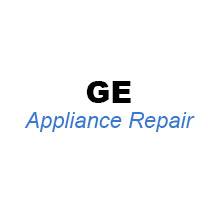Licensed & Experienced
Warranty on Parts & Labor
100% Customer Satisfaction
Award Winning Support
24/7 Emergency Service
General Electric (GE) is one of the world’s most trusted appliance brands, known for quality, iinnovation, and long-lasting performance. Even with their durability, GE appliances may require service as they age, whether due to wear, electrical issues, or heavy daily use.
When that happens, ARS Appliance Repair is here to provide fast, professional, and reliable GE appliance repair across Toronto and the GTA. Our trained technicians service all major GE models and deliver accurate diagnostics, transparent pricing, and long-lasting repair solutions.
If your GE appliance has stopped working, is making unusual noises, not heating, not cooling, or simply underperforming, call us or book online for prompt service. We provide same-day and next-day appointments whenever possible.
How to Maintain Your GE Appliances
GE appliances are built to last, but proper care can significantly extend their lifespan. Here are the top maintenance tips recommended by professionals:
Keep Appliances Clean
Regular cleaning prevents dirt, grease, and debris from interfering with sensors, motors, and airflow.
Use Within Capacity
Avoid overloading washers, dryers, and refrigerators, exceeding capacity leads to premature wear or mechanical breakdowns.
Schedule Regular Servicing
Routine checks help identify problems early, preventing costly repairs and keeping performance optimal.
Always Hire a Professional
DIY repairs often cause additional damage. Certified technicians use genuine GE parts, ensure proper diagnosis, and provide warranties for their work.
What to Look for in a GE Appliance Repair Service
- Certified and experienced GE technicians
- Use of genuine GE parts
- On-time service appointments
- Repair warranty included
- Specialization in GE appliances and systems
ARS Appliance Repair is one of Toronto’s leading GE repair service providers. With years of experience repairing GE fridges, ovens, stoves, washers, dryers, dishwashers, and more, we offer fast response times, expert diagnostics, and exceptional customer service.
We understand appliance breakdowns are inconvenient, that’s why we work hard to provide same-day appointments whenever possible. Our technicians also offer helpful tips to keep your GE appliance running efficiently long-term.
Contact us today for professional GE Appliance Repair or call 866-415-3937.
Frost Forming on Walls of Freezer?
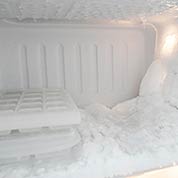
- Check if air vent is blocked. Remove obstructions so air can freely circulate.
- Allow space between food for efficient air circulation.
- Is Freezer drawer properly closed?
Water Dispenser Not Working?
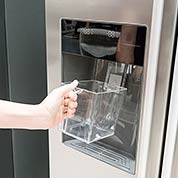
- Check if water line is connected and shut-off valve is open.
- Is water supply line tubing crushed or twisted?
- Make sure tubing is free and clear of obstructions.
- Is water tank frozen because refrigerator temperature is too low?
- Try using a warmer setting from the main menu display panel.
Ice Maker Not Making Ice?

- Did you wait 12 hours after installing water supply line before trying to make ice?
- Check if water line is connected and shut-off valve is open.
- Is ice making function button/setting manually turned off?
- Check if the Freezer temperature too warm.
- Try setting the Freezer temperature colder.
Fridge Doesn't Work at All or It Doesn't Cool Sufficiently?
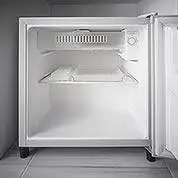
- Check if power cord is properly connected.
- Is temperature control on display panel set to the correct temperature?
- Try setting it to a colder temperature.
- Is refrigerator in direct sunlight or near any heat source?
- Is the back of the refrigerator too close to the wall that air cannot circulate?
The Food inside the Fridge is Frozen?

- Is temperature control on display panel set to the correct temperature?
- Try setting it to a warmer temperature.
- Is the temperature in the room too cold?
- Did you place food too close to air vent inside the back of the refrigerator? Move the food away from air vent.
The Fridge is Making Unusual Noises and Sounds?
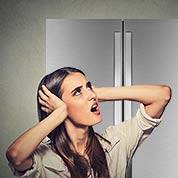
- Check if the refrigerator is stable and level on the floor.
- Is the back of the refrigerator too close to the wall that air cannot circulate?
- Check if anything was dropped behind or under the refrigerator.
- A "ticking" noise is heard from inside the fridge. It is normal because various items are expanding or contracting according to the temperature of the fridge interior.
- When automatic ice maker is on, ice is made inside the ice container. After ice is made, it falls from ice container into storage compartment and water flows through water valve. These operations cause noises at regular intervals, but those noises are normal.
Dishwasher Will Not Start?
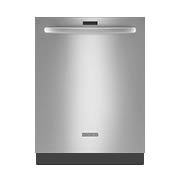
- Check if door latch is closed completely.
- No cycle selected, select proper cycle.
- Check if power cord is properly connected.
- Check if water supply valve is opened.
- The control panel is locked, dissable the 'control lock'.
- A circuit breaker is open, if so reset the circuit breaker.
Food Particles Remaining on Dishes (Dishwasher Not Cleaning Well)?
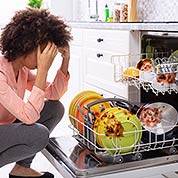
- You selected an inappropriate cycle. Select a cycle according to the number and soil level of the dishes, as directed in this manual.
- Wrong cycle selected. Select appropriate cycle according to number and soil level of dishes, see manual.
- Water temperature is low. Connect water supply line to hot water supply. For best performance, temperature of supplied water should be 49˚C (120˚F).
- Water pressure is too low. Pressure should be between 20 and 120 psi (140 - 830 kPa).
- The water is too hard. Use high-quality, fresh detergent with rinse aid.
- No Dishwasher detergent was used. Use recommended automatic dishwasher detergent, see user manual.
- Detergent remains in dispenser. Check if large items like cutting boards, pots, etc. are not blocking the dispenser from opening.
- Rearrange dishes so they don't interfere with the detergent dispenser operation.
- No rinse aid was used. Add a liquid rinse aid to the dispenser.
- Check if a spray nozzle is clogged.
- The dishes are not loaded properly. There are too many dishes or not arranged in a way that interfere with the nozzle roations or detergent dispenser. Load less dishes, see user manual for more information.
Dishwasher Leaves Glasses with a Cloudy Surface?
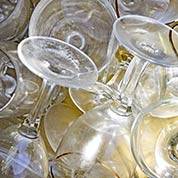
- Water supplied was too soft and/or too much detergent was used. Use less glasses and add a liquid rinse aid.
Dishwasher Does Not Dry Dishes Well?
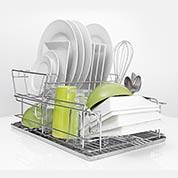
- No rinse aid was used. Add a liquid rinse aid to the dispenser.
- Water temperature is too low. Make sure the dishwasher is connected to hot water supply.
- Too many dishes are loaded. This can affect proper drying. Load dishes as recommended in the user manual.
Dishwasher has Bad Odor?
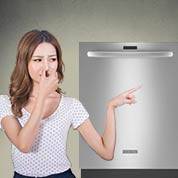
- There is leftover water from incomplete cycle. Remove all dishes, add detergent and run a normal cycle to clean dishwasher.
- The Drain Hose may be blocked. Contact a qualified appliance repair technician to repair drain hose obstructions.
- Dishwasher not being used often and/or dishes left inside too long. Remove all dishes, add 8 ounces of vinegar to empty glass upright on the bottom rack and run normal cycle.
Dishwasher is Too Noisy?
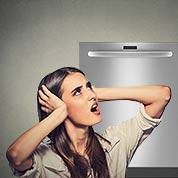
- At the early stage of operation, sound is generated from dispenser cover and drain pump. This is normal.
- Check if dishwasher is level on the floor.
- An object fell inside the pump chamber (a screw, small piece of plastic, etc). Contact a qualified appliance repair technician to remove any foreign objects from pump chamber.
- If there is a 'chopping' sound. Try rearrange the dishes to prevent the nozzles bumping against them.
Dishwasher Nozzle Not Rotating Smoothly?
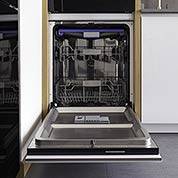
- There is food particles clogging the nozzle hole, clean the nozzle.
- Check if dishwas are loaded properly, and the nozzles are not being blocked by large pots or dishes preventing them from rotating. Rotate nozzles by hand to check if they are free from obstructions.
Water Not Draining From Dishwasher?

- The drain pump may be clogged. Contact a qualified appliance repair technician repair drain hose obstructions and check drain pump operation.
Oven Not Working?
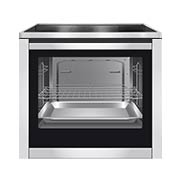
- Check if power cord is plugged in fully into a working electrical grounded outlet.
- There may be a blown fuse in your home. Check and reset the fuse inside the circuit breaker.
- Oven controls not set properly. See your user manual for details.
- Oven temperature is too hot. Allow some time for oven to cool.
Food Not Baking or Roasting Properly?
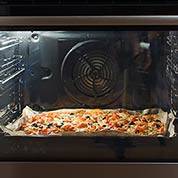
- Oven controls not set properly. See your user manual for details.
- Rack position is incorrect or the rack is not level. Refer to the user manual for instructions.
- Check if rack position is in correct location. See user manual for information.
- Wrong cookware being used, try changing size and material.
Oven Fan Making Noise?
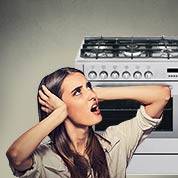
- The oven convection fan may turn on and off occationally. This is normal.
Oven Door Not Opening After a Self Cleaning Cycle?

- Oven temperature is too hot. Allow some time for oven to cool.
Oven Self-Cleaning Not Working?

- Oven temperature is too hot to set self-cleaning operation. Allow some time for oven to cool and reset controls.
- Oven controls not set properly. See your user manual for details.
- Self-cleaning operation can't start if the lockout feature is turned on.
Stove Temperature Not Heating Fast Enough or Can't Maintain a Boil?
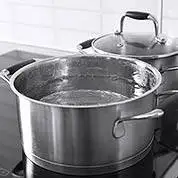
- Wrong cookware being used, try changing size and material or use flat pans to match diameter of surface unit selected.
- Try to cover pan with lid until desired temperature is reached. Contact a qualified appliance repair technician to check if main supply power (voltage) is too low.
Stove Does Not Work Properly?
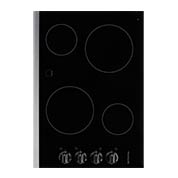
- There may be a blown fuse in your home. Check and reset the fuse inside the circuit breaker.
- Cooktop controls not set properly. See your user manual for details.
- Contact a qualified appliance repair technician to diagnose your stove.
Stove Not Glowing When Set to a Lower Temperature?
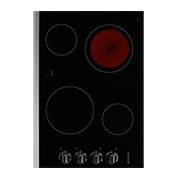
- This is normal. The stove is still on and hot
Stove Frequenty Cycling On and Off?

- This is normal. The stove will cycle on and off to maintain the set temperature.
Washer Stops Frequently?
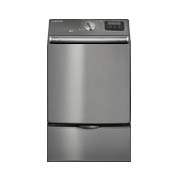
- Check if power cord is properly connected into a working electrical outlet.
- There may be a blown fuse in your home. Check and reset the fuse inside the circuit breaker.
- Make sure the door is completely closed shut. Then restart the washer, for your safety, washer won't spin unless the door is closed.
- Before the cycle starts the washer will make a few clicking sounds to check door and drain before starting to fill
- There is sometimes a soak or pause period in the cycle. Wait a few minutes for the washer to start again
- Check the mesh filter of the water supply hose. Clean it periodically to remove any blockages
- There could be insufficient power supply. The washer may temporarily not spin or drain. It will restart when power is regained. Contact a qualified appliance repair technician to diagnose your washer.
Washer Fills With Wrong Water Temperature?
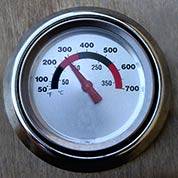
- Open both water taps fully.
- Check the settings if temperature selection is correct.
- Check if the hoses are connect to the correct taps.
- Check your water heater. Make sure it is set to supply hot water with a minimum temperature of 49 °C (120 °F). Also, check the capacity and recovery rate settings.
- Check the mesh filter of the water supply hose. Clean it periodically to remove any blockages
- The automatic water temperature control feature may check and change the water temperature while the washer is filling in some models. This is normal.
- The automatic water temperature control feature may fill only cold or hot water while the washer is filling in some models to determine water temperature before it is changed. This is normal.
Clothes Extra Wet at the End of the Cycle?
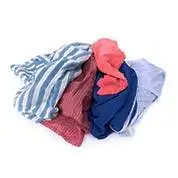
- Use high or extra high spin speed setting.
- Try using a different 'high efficiency' detergent to reduce 'oversudsing'.
- The load was too small. Small loads may not spin completely, try adding more clothes.
- The Drain Hose may be blocked. Contact a qualified appliance repair technician to repair drain hose obstructions.
Washer is Leaking Water?
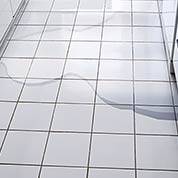
- Make sure the door is completely closed shut.
- Check all hose connections. Make sure they are all tight. Contact a qualified appliance repair technician to diagnose your washer if this doesn't help.
- Check the end of drain hose to make sure it is connected to drain system.
- Check the fill hose connection. Tighten if it is loose at the water tap.
- Check the house drain pipes. Remove blockage.
- Don't overload the washer.
- Try using a different 'high efficiency' detergent to reduce 'oversudsing'.
Washer Has Bad Odor?
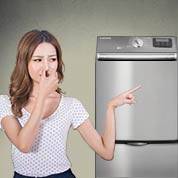
- Too much foam / suds is collected inside washer which can produce foul odor.
- Run a cleaning cycle periodically on your washer.
- Clean the door seal. There could be some residue here producing foul odor.
- Dry the washer interior after the cycle is finished.
Washer Producing Excessive Suds (Soapy Water)?
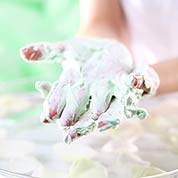
- Try using a different 'high efficiency' detergent to reduce 'oversudsing'. Use only detergent with the HE (High-Efficiency) logo.
Washer Making Vibrating or Clanking Noises?
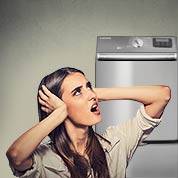
- Remove all shipping and packaging bolts and materials. See user manual.
- Check if clothes are loaded correctly and evenly inside the washer. Try to rearrange them and try again.
- Make sure the washer is stable and level on the floor. Try adjusting the leveling feet.
- Make sure the washer is on a solid floor. See user manual.
- Check the washer for small objects like buttons, coins etc. and remove them.
Dryer Not Running?
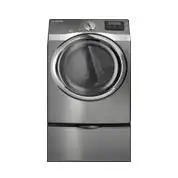
- Make sure the door is completely closed shut.
- Check if power cord is plugged in fully into a working electrical outlet.
- There may be a blown fuse in your home. Check and reset the fuse inside the circuit breaker.
- Press the start button again if door is opened during the cycle.
- It could be a circuit overload problem. Contact a qualified appliance repair technician to repair your dryer.
- Clean the lint filter.
Dryer Not Heating?

- There may be a blown fuse in your home. Check and reset the fuse inside the circuit breaker.
- Some drying cycles don't require heating. Check the selected cycle and try again.
- Try cleaning the lint filter and exhaust duct.
- The drying cycle may have moved into the cool-down phase. This is normal. Check the selected cycle and change settings.
Dryer Not Drying / Clothes Take Too Long to Dry?

- Check the exhaust hood outside your home if it open and close freely.
- Check if the exhaust system has a buildup of lint. This should be cleaned and inspected annually.
- Try using a 4 inch rigid metal exhaust duct.
- Remove some of the clothes. Don't overload dryer. 1 dryer load = 1 wash load.
- Try drying light weight and heavy items separately.
- Large, bulky items such as blankets, may require to be repositioned to ensure even drying.
- Make sure the dryer is draining the water properly. Contact a qualified appliance repair technician to diagnose your dryer.
- The load may be too small for dryer to tumble properly. Add a few items and restart the dryer.
- The load may be too large for dryer to tumble properly. Remove a few items and restart the dryer.
- Clean the lint filter.
- Check if the exhaust ducts are blocked or if the duct run is too long.
Dryer is Making Noise?
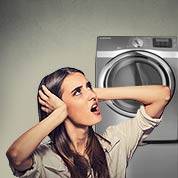
- Check the dryer for small objects like buttons, coins etc. and remove them.
- Make sure the dryer is stable and level on the floor.
- Dryer could make a humin noise because of high velocity air moving through the drum or exhaust. This is normal.
There is Too Much Lint on Clothes After Drying?
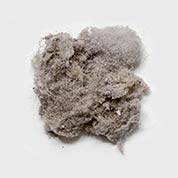
- Clean the lint filter before every load. For some types of clothes which build more up more lint, clean the filter during the cycle.
- Some fabrics which produce alot of lint (ex: fuzzy sweater) should be dryed seperatly from fabrics which are lint trappers (ex: linen pants).
- Try dividing large loads into smaller loads for drying.
- Check the pockets of clothes before drying, there could be more lint.
- Check for and remove the lint from inside the drum before drying.
Air Conditioner Not Cooling?
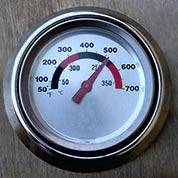
- Check if AC is set to fan mode.
- Change the setting to cooling mode and/or decrease temperature.
- Check the voltage stabilizer if your AC is connected. It may need to be replaced.
- There may be a blown fuse in your home. Check and reset the fuse inside the circuit breaker.
Air Conditioner Not Heating?

- Check if AC is set to fan mode.
- Change the setting to heating mode and/or increase temperature.
- Check the voltage stabilizer if your AC is connected. It may need to be replaced.
- There may be a blown fuse in your home. Check and reset the fuse inside the circuit breaker.
Air Conditioner Making Noise?
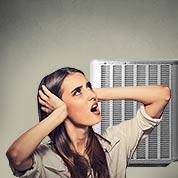
- If the noise is occurring after cleaning the air filter, check if the air filter was inserted properly.
- Check if the filter cover is closed fully.
- Check if there is a small foreign object inside the AC and move away from any obstacles.
- Make sure the AC is stable and level on the floor. Try adjusting the leveling feet.
Air Conditioner Leaking?

- Drain hose is under water, bent upwards or not set to the right angle.
- Drain hose may be blocked or damaged. Remove blockage from hose.
- Check the air filter. It might need to be cleaned.
- The AC is leaning too far forward or backward on a slope. See user manual.
📅Book Your GE Appliance Repair Service Today
📅Book Your GE Appliance Repair Service Today
📅Book Your GE Appliance Repair Service Today
Call Our GE Appliance Repair Technicians Today!
Book an appointment today with our technicians for GE Appliance Repair Service.
